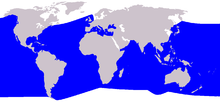Cuvier's beaked whale - Simple English Wikipedia, the free encyclopedia
| Cuvier's beaked whale | |
|---|---|
 | |
 | |
| Size compared to an average human | |
| Scientific classification | |
| Domain: | Eukaryota |
| Kingdom: | Animalia |
| Phylum: | Chordata |
| Class: | Mammalia |
| Order: | Artiodactyla |
| Infraorder: | Cetacea |
| Family: | Ziphiidae |
| Genus: | Ziphius Cuvier, 1823 [2] |
| Species: | Z. cavirostris |
| Binomial name | |
| Ziphius cavirostris | |
 | |
| Range of Cuvier's beaked whale | |
Cuvier's beaked whale (Ziphius cavirostris), is the only member of the genus Ziphius. It is the most widely distributed of all the beaked whales.[3]
It is a record deep diver:
- "Cuvier’s beaked whales are likely to be the most extreme divers among marine mammals, able to go nearly 3km down and hold their breath for more than two hours".[4]
History of discovery
[change | change source]The French anatomist Georges Cuvier, in his Sur les Ossemens fossiles (1823),[5] first described the species based on an imperfect skull from the Mediterranean coast of France. A peasant had found it on the shore in 1803.
Cuvier named it Ziphius cavirostris. The specific name comes from the Latin cavus for "hollow" or "concave". This refers to the deep hollow in the skull, a diagnostic trait of the species. Cuvier believed it was an extinct species. In 1850 zoologists realized the species was still living, when Paul Gervais compared the type specimen to a whale stranded at Aresquiès, Hérault. He found the two to be identical.[6]
Prey
[change | change source]Cuvier's beaked whale feeds on several species of squid. They also prey on deep-sea fish.[7] On March 27 2014 a Cuvier's beaked whale tracked by a satellite-linked tag set a new deep diving record for a sea mammal, plunging nearly two miles below the ocean surface.[4]
Although it is in the Odontoceti, it has little use for teeth. As adults, two incisors at the front of the lower jaw stick forward. Basically, it sucks in prey by expanding its throat.[8]
References
[change | change source]- ↑ "Ziphius cavirostris Cuvier 1824 (Cuvier's beaked whale)". PBDB.
- ↑ 2.0 2.1 William Perrin (2014). Perrin WF (ed.). "Ziphius Cuvier, 1823". World Cetacea Database. World Register of Marine Species. Retrieved 16 March 2015.
- ↑ Grzimek, Bernhard et al 2003. Grzimek's animal life encyclopedia. Vol 15, Mammals IV. 2nd ed, Farmington Hills, MI: Gale. ISBN 0-7876-5362-4
- ↑ 4.0 4.1 Amos, Jonathan 2014. Beaked whale is deep-dive champion. BBC News Science & Environment. [1]
- ↑ Cuvier, Georges 1823. Recherches sur les ossemens fossiles. 5.1 (2nd ed), Paris, 350–2, fig 7.
- ↑ Turner W. 1872. On the occurrence of Ziphius cavirostris in the Shetland Seas, and a comparison of its skull with that of Sowerby’s whale (Mesoplodon Sowerbyi). Transactions of the Royal Society of Edinburgh 26 (4): 759–80.
- ↑ Evans, Peter G.H. 1987. The natural history of whales and dolphins. New York: Facts on File, p137. ISBN 0816017328
- ↑ Heyning, John E 2002. Cuvier's beaked whale. In Jefferson, Thomas A. Encyclopedia of marine mammals. Academic Press, 305–7. ISBN 0-12-551340-2


 French
French Deutsch
Deutsch